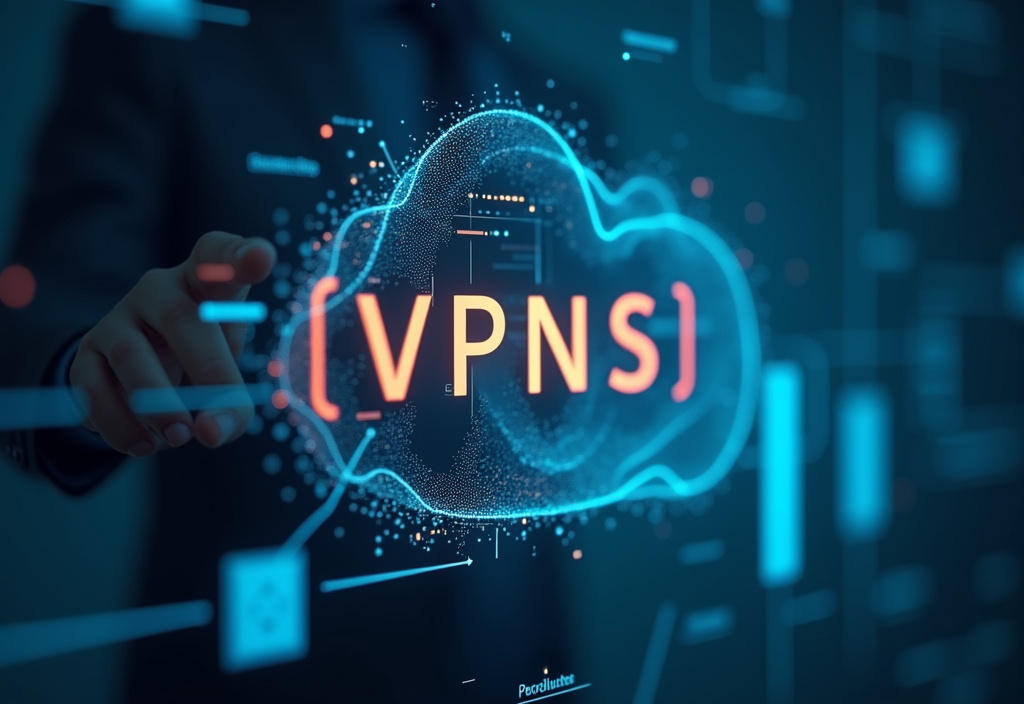VPNs for Financial Brokers: Securing Transaction Data

Table of Contents
financial broker VPN
In the high-stakes world of financial brokerage, where milliseconds can translate to millions and trust is the bedrock upon which fortunes are built, the security of transaction data is paramount. Financial brokers, entrusted with handling sensitive financial information and executing critical transactions, face a constant barrage of cyber threats, ranging from sophisticated hacking attempts to insidious data breaches. Protecting this data is not merely a matter of compliance; it's a fundamental imperative for maintaining client trust, safeguarding reputation, and ensuring the continued viability of the business.
This article explores the critical role of Virtual Private Networks (VPNs) in bolstering the security posture of financial brokerages, focusing on how these tools protect sensitive transaction data, build client confidence, and contribute to a more secure and resilient financial ecosystem. A establishes a secure, encrypted tunnel for all internet traffic, shielding sensitive data from prying eyes and malicious actors lurking on public networks or intercepting communication channels. Imagine a physical armored car transporting valuable assets; the VPN acts as a virtual equivalent, creating an impenetrable barrier around data as it traverses the internet.
By masking the broker's IP address and encrypting data transmitted between their devices and the financial markets, a VPN significantly reduces the attack surface, making it far more difficult for cybercriminals to gain unauthorized access to critical systems and confidential client information. This proactive approach to security is vital in an era where cyber threats are constantly evolving and becoming increasingly sophisticated. The benefits extend beyond simple encryption.
VPNs can also provide a layer of anonymity, preventing market manipulation attempts by masking the origin of trading activity. This is particularly important for brokers engaged in high-frequency trading or dealing with large positions, where even subtle clues about their trading strategies could be exploited by competitors. Think of it as a cloak of invisibility, concealing the broker's digital footprint and preventing them from becoming a target of unfair or malicious trading practices.
Furthermore, a robust VPN solution can help brokers comply with stringent regulatory requirements, such as GDPR, CCPA, and industry-specific regulations, which mandate the protection of client data and the implementation of adequate security measures. Non-compliance with these regulations can result in hefty fines, legal repercussions, and significant reputational damage. By demonstrating a proactive commitment to data security through the use of a , brokers can build stronger relationships with clients, attract new business, and maintain a competitive edge in an increasingly complex and vulnerable financial landscape.
The choice involves considering encryption protocols, server locations, logging policies, and overall performance, ensuring the chosen provider aligns with the specific needs and risk profile of the brokerage firm. Failing to prioritize could lead to devastating consequences, including financial losses, reputational damage, legal repercussions, and a loss of that could take years to rebuild. Therefore, a carefully selected and properly implemented VPN is not just an IT add-on; it's a fundamental pillar of a robust security strategy for any financial brokerage operating in the modern digital age, guaranteeing and enabling secure, confident transactions.
Consider the investment in a VPN as an investment in the long-term success and stability of the brokerage firm, safeguarding its assets, reputation, and client relationships.
financial broker VPN
The core functionality of a VPN lies in its ability to create a secure and encrypted connection between the user's device and a remote server. This process is achieved by encapsulating internet traffic within an encrypted tunnel, effectively masking the user's IP address and preventing third parties from intercepting or monitoring the data being transmitted. For financial brokers, this secure tunnel acts as a shield, protecting sensitive financial information, trading strategies, and client data from potential cyberattacks.
The mechanics are relatively straightforward yet profoundly effective. When a broker initiates a VPN connection, their device establishes a secure link with a VPN server, often located in a different geographical region. All subsequent internet traffic is then routed through this server, effectively concealing the broker's actual IP address and location.
Just like a secret agent using a burner phone to mask their identity and prevent tracing, the VPN helps to obscure the broker's digital footprint. The encryption protocols used by VPNs are complex algorithms that scramble data into an unreadable format, rendering it useless to anyone who does not possess the decryption key. Common encryption protocols include AES (Advanced Encryption Standard), which is widely regarded as one of the most secure and robust encryption standards available, and OpenVPN, an open-source protocol that offers a high degree of security and flexibility.
Think of encryption as a digital lock and key, ensuring that only authorized parties can access the sensitive information being transmitted. When a financial broker connects to a VPN server, their internet traffic is routed through this encrypted tunnel, effectively masking their true IP address and replacing it with the IP address of the VPN server. This makes it much more difficult for cybercriminals to track the broker's online activity or identify their location.
Furthermore, the encrypted tunnel prevents eavesdropping on sensitive communications, such as login credentials, trading orders, and client data. Imagine a wiretap being rendered useless because all the intercepted conversations are just garbled noise; that's the power of encryption. By utilizing a , a firm actively bolsters its , mitigating risks associated with public Wi-Fi networks, unsecured internet connections, and man-in-the-middle attacks.
Public Wi-Fi hotspots, often found in coffee shops and airports, are notorious for their lack of security, making them prime targets for hackers looking to steal sensitive information. A VPN provides a vital layer of protection, ensuring that even if the broker is using an unsecured network, their data remains encrypted and unreadable. This increased level of security is crucial for maintaining , as clients need to feel confident that their financial information is being handled with the utmost care and protection.
Implementing a VPN demonstrates a proactive approach to , showing clients that the brokerage is committed to safeguarding their interests and maintaining the integrity of the financial system. A serves as a first line of defense against cyber threats, ensuring that sensitive data remains confidential and secure, even in the face of increasingly sophisticated attacks. Beyond the technical aspects of encryption and IP masking, a VPN also provides an added layer of anonymity, which can be particularly beneficial for brokers engaged in sensitive trading activities.
By masking their true location and IP address, brokers can prevent their trading strategies from being monitored and exploited by competitors or other market participants. This anonymity can also help to protect brokers from potential threats or harassment, especially in cases where they are dealing with high-profile clients or executing large trades. It's like having a bodyguard who not only protects you from physical harm but also shields you from unwanted attention and scrutiny.
transaction security
The choice of VPN provider is a critical decision that can significantly impact the level of security and performance experienced by financial brokers. Not all VPN services are created equal, and it's essential to carefully evaluate different providers based on their security features, performance, reliability, and logging policies. Selecting the right VPN is akin to choosing the right financial advisor; careful due diligence is required to ensure a secure and profitable outcome.
A key consideration is the encryption protocol used by the VPN. As mentioned earlier, AES and OpenVPN are widely regarded as the most secure and robust protocols available, and it's advisable to choose a provider that supports these standards. Think of it as selecting a bank vault with the strongest possible locks and security measures.
Another important factor to consider is the server location. The closer the VPN server is to the broker's physical location, the lower the latency and the faster the connection speed. This is particularly crucial for brokers engaged in high-frequency trading, where even milliseconds of delay can have a significant impact on profitability.
However, it's also important to choose a provider with a diverse network of servers in different geographical locations, as this provides greater flexibility and allows brokers to bypass geo-restrictions or access content that may be blocked in their region. It's analogous to having access to multiple trading floors around the globe, allowing you to seize opportunities wherever they arise. Logging policies are another crucial aspect to evaluate.
Some VPN providers maintain detailed logs of user activity, including browsing history, IP addresses, and connection times. This information could potentially be subpoenaed by law enforcement or other authorities, compromising the broker's privacy and security. Therefore, it's best to choose a provider that has a strict no-logs policy, meaning that they do not collect or store any information about user activity.
Opting for a no-logs VPN is like hiring a discreet bodyguard who promises to never reveal your secrets. The performance and reliability of the VPN are also essential factors to consider. A slow or unreliable VPN can significantly impact the broker's trading performance, leading to missed opportunities and potential financial losses.
It's important to choose a provider that offers fast connection speeds, low latency, and a stable network infrastructure. Speed tests and user reviews can provide valuable insights into the performance of different VPN providers. Imagine trying to execute a crucial trade with a phone that constantly drops the call; a reliable VPN ensures a seamless and uninterrupted connection.
Furthermore, the VPN provider should offer robust customer support, in case any issues arise. Prompt and effective customer support can be invaluable in resolving technical difficulties and minimizing downtime. It's like having a dedicated IT team on standby, ready to assist you with any technical challenges.
In addition to these core features, there are several other factors that financial brokers may want to consider when choosing a VPN provider, such as the number of simultaneous connections allowed, the availability of specialized servers optimized for specific tasks (e.g., streaming, gaming), and the overall cost of the service. It's about finding the perfect balance between security, performance, and affordability to meet the specific needs of the brokerage firm. Ultimately, the best VPN provider for a financial broker is one that offers a comprehensive suite of security features, a reliable network infrastructure, a strict no-logs policy, and excellent customer support.
By carefully evaluating different providers based on these criteria, brokers can ensure that they are choosing a VPN that will provide them with the highest possible level of protection and performance. The right choice enhances , reinforces , strengthens , and solidifies the firm’s position in a competitive market, all facilitated by a strategically chosen
information protection
Implementing a VPN within a financial brokerage isn't simply about subscribing to a service; it involves a strategic integration into the existing IT infrastructure and a clear understanding of the potential impact on workflows. A phased approach, starting with a pilot program, is often the most effective way to ensure a smooth and successful implementation. It’s akin to testing a new trading strategy on a small scale before rolling it out across the entire portfolio.
The initial phase should involve identifying key users and departments within the brokerage that would benefit most from VPN protection. These may include traders, financial analysts, compliance officers, and executives responsible for handling sensitive client data. By focusing on these high-risk areas first, the brokerage can quickly realize the benefits of the VPN and gain valuable insights into its performance and effectiveness.
Think of it as deploying your strongest defenses to protect your most valuable assets. Next, it's crucial to configure the VPN settings to meet the specific security needs of the brokerage. This may involve customizing encryption protocols, whitelisting specific IP addresses, and implementing multi-factor authentication to enhance security.
Working with a cybersecurity expert can be invaluable in ensuring that the VPN is properly configured and optimized for maximum protection. A well-configured VPN acts as a digital fortress, protecting the brokerage from a wide range of cyber threats. Training employees on how to use the VPN is also essential.
Employees need to understand the importance of using the VPN whenever they are accessing sensitive data or connecting to public Wi-Fi networks. Clear guidelines and procedures should be established to ensure that employees are using the VPN consistently and correctly. Educating employees is like equipping them with the knowledge and skills they need to defend themselves against phishing attacks and other social engineering tactics.
Beyond the technical aspects of implementation, it's also important to address any potential impact on workflows. A VPN can sometimes slow down internet speeds, which can be a concern for traders who rely on real-time market data. Therefore, it's important to choose a VPN provider that offers fast connection speeds and low latency, and to optimize the VPN settings to minimize any performance impact.
It’s about striking a balance between security and performance, ensuring that the VPN doesn't hinder the broker's ability to trade effectively. Regular monitoring and maintenance are also essential for ensuring the continued effectiveness of the VPN. The brokerage should monitor the VPN logs for any suspicious activity and regularly update the VPN software to patch any security vulnerabilities.
Proactive monitoring and maintenance are like conducting regular checkups on your car to ensure that it's running smoothly and efficiently. Furthermore, the brokerage should conduct periodic security audits to assess the overall effectiveness of its VPN implementation and identify any areas for improvement. These audits should be conducted by independent cybersecurity experts to ensure an unbiased assessment.
Periodic security audits are like having an independent inspector examine your building to ensure that it meets all safety standards. By taking a strategic and proactive approach to VPN implementation, financial brokerages can ensure that they are maximizing the benefits of this vital security tool. This includes better , maintaining , and ensuring secure financial transactions by using a reliable solution.
This comprehensive approach to will also improve the reputation of the firm, making it the preferred choice for investors. A well-implemented VPN serves as a cornerstone of a robust security strategy, protecting the brokerage from cyber threats and ensuring the confidentiality, integrity, and availability of its data.
financial broker VPN
The future landscape of VPNs for financial brokers points towards greater integration with advanced security technologies and a more proactive approach to threat detection and prevention. As cyber threats become increasingly sophisticated, VPNs will need to evolve beyond simple encryption and IP masking to incorporate features such as threat intelligence, behavioral analytics, and automated incident response. Think of it as upgrading from a basic security system to a smart home security system that can anticipate and respond to potential threats in real-time.
One key trend is the integration of VPNs with Security Information and Event Management (SIEM) systems. SIEM systems collect and analyze security logs from various sources, including VPNs, to identify potential security threats and anomalies. By integrating VPN logs into a SIEM system, financial brokerages can gain a more comprehensive view of their security posture and quickly detect and respond to any suspicious activity.
This integration is like having a central command center that monitors all aspects of your security and alerts you to any potential problems. Another trend is the use of behavioral analytics to detect unusual VPN usage patterns. For example, if an employee suddenly starts connecting to the VPN from a different country or accessing sensitive data outside of normal business hours, this could be an indication of a compromised account.
By analyzing VPN usage patterns, financial brokerages can quickly identify and respond to potential security breaches. It's like having a detective who can spot subtle clues that indicate something is amiss. Furthermore, VPNs are likely to become more tightly integrated with other security tools, such as firewalls, intrusion detection systems, and anti-malware software.
This integration will allow for a more coordinated and effective response to cyber threats. Imagine a team of superheroes working together to protect the city from evil; integrated security tools can provide a more comprehensive and effective defense. The rise of cloud computing is also driving the evolution of VPNs.
As more financial brokerages move their data and applications to the cloud, they will need VPNs that can securely connect their employees to cloud resources. This requires VPNs that are optimized for cloud environments and that can seamlessly integrate with cloud security tools. It's about ensuring that your data remains secure, even when it's stored in the cloud.
In addition to these technological advancements, there is also a growing emphasis on regulatory compliance. As data privacy regulations become more stringent, financial brokerages will need to ensure that their VPN implementations comply with all applicable laws and regulations. This requires working with VPN providers that are committed to data privacy and that can provide the necessary documentation and support to demonstrate compliance.
It's about staying on the right side of the law and protecting yourself from potential fines and legal repercussions. The future of VPNs for financial brokers is about more than just security; it's also about enhancing productivity and improving the user experience. VPNs are likely to become more user-friendly and easier to manage, allowing employees to connect securely to corporate resources from anywhere in the world.
It’s all about creating a secure and seamless environment for financial activities. Ultimately, the future of VPNs for financial brokers is about creating a more secure, resilient, and compliant financial ecosystem. By embracing these trends and proactively implementing advanced VPN technologies, financial brokerages can protect their data, maintain client trust, and thrive in an increasingly complex and challenging cyber landscape.
The key now and in the future is how well a firm integrates a into its overall security framework to ensure strong , build unwavering , provide robust , and capitalize on the benefits of a secure .
Stay Updated
Get the latest VPN news, tips, and exclusive deals to your inbox.




